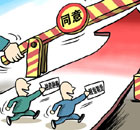-
-
China Daily E-paper
Web Comments
A medical rule that becomes abreaction
By Zhang Jin (Chinadaily.com.cn)
Updated: 2010-02-08 17:19
 |
Large Medium Small |
A Sina.com.cn survey showed that the new regulation - which allows the hospital to go ahead with an emergent operation without the consent from the patient’s family members - failed to win a landslide approval from the public.
More than 45 percent of nearly 12,700 Web users either opposed the rule or viewed it with a pinch of salt.
This appears weird.
| ||||
After all, most of us are not professional in medical sciences and we should let the choice be with professionals in case of a tearing hurry.
Then, why are so many people against the new rule?
The first reason, as some netizens have suggested, is that the rule violates people's right to know.
This reason sounds lofty, especially as Chinese nowadays are all the more aware of public right to information. The regulation, however, shows decent respect to that right. It stipulates that the hospital will do by itself only after the patient loses the capacity to act for himself and family members' nods are by no means immediately available. After all, we cannot unconditionally bow to the right to know when a life is dying.
The second reason is of the clarification of responsibility. Some asked: Who should be held accountable if the operation fails, family members, hospitals, or neither of them?
The question does address a demerit of the rule, but shall we give up the chance to save a life just because the responsibility is not yet clear?
Other reasons for objection, as listed by posts at Sina.com.cn, are general and ambiguous: The rule will make patients doctors' cash cows; The rule bestows greater rights to already poorly-regulated hospitals; and Who would stand out to help those vulnerable groups?
Their worries, some of which are away from the point though, speak many people's mind.
Indeed, Chinese media are awash with stories about doctors colluding with medicine dealers to rip off patients, doctors taking bribes and people queuing outside hospitals for treatments.
Too much has been reported about the dirty trade, and one of the latest cases that sent the image of doctors to a low was the death of an infant in Nanjing, after it was not properly taken care by a doctor who played online game on duty. It is unfair to say, but believed by some people, that the profession has become synonymous with greed and corrupt.
In simple words, people are grasping this opportunity to pour their anger at dirty trade in the medical circle, not the regulation itself.












